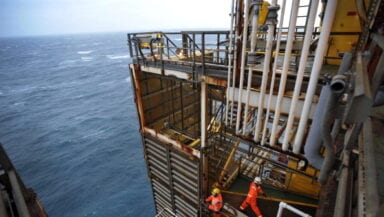Offshore oil and gas workers have been the backbone of Britain’s energy industry for fifty years. So it would seem that the government’s decision to continue issuing offshore oil licences in the North Sea would be welcome.
But all across the North East – from the Humber Estuary to Teesside in England, and all the way up to Aberdeen in Scotland – things aren’t actually going that well. The oil and gas industry is volatile, and communities are suffering from this volatility.
After years of decline, falling prices due to financial crises, Covid, and other economic shocks thanks to global oil politics, the UK’s oil and gas workers have been dealt a raw deal. Restructuring by major oil companies and their contractors and agencies has meant insecure work and falling salaries. And it’s some of the most dangerous work out there.
Now, the government’s focus on new oil licences ‘with climate conditions’ attached, is just kicking offshore workers’ problems into the long grass.
It shows how the government has so far been unable to get a grip on the needs of the UK’s energy key workers. According to a 2020 survey of offshore oil and gas workers, these overwhelmingly centre around government support to transition towards work in a stable, growing renewables sector.
This is not the way the government should be treating the country’s energy key workers. And it shows there is no government plan to help offshore workers transition smoothly to work in renewable energy.
Plus, If everyone copied the UK’s approach to fossil fuels, our globally agreed climate targets would not be met. The UK’s not exactly leading by example, ahead of hosting the COP26 climate talks in Glasgow this year.
Offshore workers deserve a better future
Offshore oil and gas work is not for the faint-hearted. And it used to pay well – even if that came at the cost of family time and the conveniences of life on land. But now, offshore oil workers are facing year after year of falling wages and exploitative contracts.
Even worse, money is tight, so health and safety could be compromised. That is not what you want working out at sea.
Most offshore oil and gas workers are highly skilled and could power the transition away from fossil fuels and towards offshore wind energy. In fact, many offshore workers see themselves as just that – offshore workers. They can work on oil rigs or wind turbines – as both sectors require similar skills.
The future of UK energy is offshore wind. By hesitating to cancel oil and gas licenses for good, the UK government seems more concerned about propping up an outdated fossil fuels sector. All this when it could be making investments in creating, funding, supporting and stabilising a vibrant offshore renewable energy sector.
It appears that the decision to keep going with oil licensing has more than likely been influenced by oil companies, not the needs of offshore workers.
Continuing to push the possibility of new oil and gas licenses is the easy way out
The government is still using twentieth-century thinking to solve a twenty-first century problem. The science is clear, and the international community has agreed – all countries have to reduce their greenhouse gas emissions.
The pragmatic thing to do is to stop issuing licenses for fossil fuels that are wrecking the climate. But the government must at the same time invest heavily in renewable energy – ensuring energy workers have a slice of the action. Done well, this would amount to a smooth, fair, ‘just transition’ away from fossil fuels; one that provides secure jobs for decades to come.
Continued outdated policymaking on oil and gas licences – that focuses on corporate profits rather than stable, well-paid jobs for workers – only prolongs uncertainty for the sector.
What’s more, new oil and gas licences mean that the UK will fail to meet its climate commitments, putting future generations and coastal communities at far greater risk. And it absolutely sends the wrong message to other countries at COP26, which the UK is hosting in Glasgow this year.
Renewable energy is already providing solid opportunities for workers
The government has the power to change the lives of oil and gas workers left high and dry by an unstable industry.
It could make investments that transform the UK’s North Sea coastal communities. This would create good, green jobs for workers up and down the north east coast in manufacturing and offshore wind. If ministers can do this, why wouldn’t they?
Some of the UK’s closest neighbours have already committed to definitive action.
Denmark ended all new oil and gas licensing in December 2020, with a plan to stop extracting fossil fuels by 2050. Thanks to pioneering technologies and sustained investment since the 1970s, Denmark has the highest wind power output in the world. And a new global commission focusing on putting people at the heart of energy transitions is headed by the Danish prime minister – showing a commitment to a just transition.
The UK has a proud industrial history, and is slowly turning towards the future. In March 2021, the government announced that it would invest almost £100 million into turning ex-steelworks into making parts for offshore windfarms in north east Lincolnshire and Teesside. The plan will create 6,000 jobs.
This is great news for those communities – but what about the tens of thousands of offshore oil rig workers that will need help re-skilling? And where is the sustained public investment for offshore wind – to create a huge new industry to hire them for good old fashioned offshore jobs-for-life?
Through its indecision on offshore oil and gas licences, the government is showing that it’s not committed to this urgently needed change in energy investments.
In terms of the UK’s climate commitments, new oil and gas licences make no sense
The UK has committed to phase out oil and gas to get to net zero by 2050 – that is unachievable even if oil companies stick to oil contained within their existing licences.
If the government goes ahead with plans to issue new oil and gas licenses in UK waters, an estimated 14.3 billion barrels of oil equivalent of oil and gas could be extracted in total from current and future production by 2050, which would release up to 5.7 gigatonnes of CO2 emissions when burned.
Energy minister Anne-Marie Trevelyan is hoping that the ‘North Sea Transition Deal’ will be a global model for countries looking to shift away from oil and towards clean energy. If this is the case, why is the government keeping the door open for new oil and gas licences?
If the government makes a bold move to transition away from fossil fuels the year it hosts the COP26 climate talks, it will show powerful global climate leadership.
It will also signal to markets, other governments and the industry as a whole that the future of energy is renewable.



